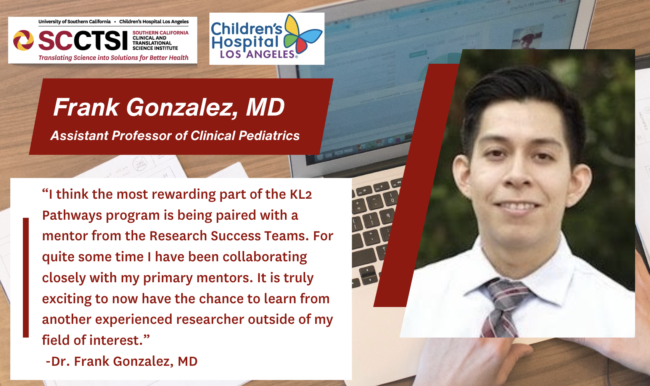An interview with Dr. Frank Gonzalez, KL2 Pathways Scholar at Children’s Hospital Los Angeles
We sat down with Dr. Frank Gonzalez, a KL2 Pathways Scholar at Children’s Hospital Los Angeles, to hear about his experience and how he has furthered his professional goals. We look forward to seeing all he will accomplish in the coming years.
Tell us a little bit about your experience so far in the KL2 Pathways program.
I have had nothing but positive experiences since beginning the KL2 Pathways program. I have been attending the Research Success Teams (RST) educational sessions, engaged in meetings and feedback with Dr. Tamara Simon, who is my assigned RST+ mentor, and ultimately have been able to spend more time on my development as an environmental health services researcher.
How did you first learn about the program?
I learned about the program from a previous KL2 Pathways program awardee, Dr. Anna Cushing, who informed me about what a wonderful opportunity it was. Her participation in the KL2 Pathways program supported her in her successful reapplication to the KL2 Mentored Career Development and inspired me to apply as well.
What initially got you interested in starting this program?
During my initial application to the KL2 Mentored Career Development Award, I struggled to balance my clinical obligations with my research endeavors as I did not have substantial protected research time. With the protected research time offered by the KL2 Pathways program, I knew that I would have the ability to dedicate myself more fully to crafting my reapplication in addition to completing, and initiating, research projects.

Tell us about your own background as a researcher in environmental health.
My journey as an environmental health services researcher began in my pediatric emergency medicine fellowship. My fellowship project aimed to investigate the associations between environmental exposures and acute health complications for children and youth with sickle cell disease. That continues to be my primary area of research with my long-term career objective being to develop a patient centered, clinical intervention to improve health outcomes for pediatric patients with sickle cell disease.
What drove you to specialize in this?
Seeing children with sickle cell disease present to the emergency department in significant pain from their disease with the anecdotal evidence that environmental exposures (such as sudden swings in temperature) triggered their pain was my primary driver. Additionally, the relative lack of effective treatment options for sickle cell disease spurred me to want to understand the environmental exposures that were associated with health complications. In doing so, I could use that knowledge to craft a clinical intervention aimed at mitigating the health risks of these environmental exposures.
What do you think that others can gain from this program?
In addition to the protected research time that is afforded by the program, the research mentorship gained from participating in the program is also invaluable for early-stage investigators. Being paired with Dr. Tamara Simon from the Southern California Clinical and Translational Science Institute (SC CTSI) has offered me the opportunity to glean valuable feedback from a knowledgeable researcher that is not one of my primary mentors. By incorporating her feedback, I have been able to better craft my research aims and conclusions to suit a broader audience. Lastly, participating in the works-in-progress sessions will also allow me to review my research aims and grant applications from other respected and experienced researchers at CHLA.
Have you run into any challenges or obstacles along the way?
Prior to my participation in the KL2 Pathways program my biggest obstacle was finding enough time in the day to work on my research endeavors. Especially as an early-career researcher, it was demoralizing to try to write a manuscript or develop a new research project after a long week of clinical shifts where I already felt both physically and mentally fatigued.
What has been the most rewarding part of being a part of the KL2 Pathways program?
I think the most rewarding part of the KL2 Pathways program is being paired with a mentor from the Research Success Teams. For quite some time I have been collaborating closely with my primary mentors. It is truly exciting to now have the chance to learn from another experienced researcher outside of my field of interest!
What does the program mean to you and how has it furthered your career?
To me, the program represents freedom and opportunity. In the few months since starting the program, I already feel rejuvenated and with a growing sense of excitement over the prospect of becoming an independently funded researcher. I have already been able to work on multiple manuscripts, start two new projects, and form collaborations with other environmental health researchers across the nation. I look forward to continuing to use my protected research time to re-apply for the KL2 Mentored Career Development Award in the Fall of 2025.
Who else has been an integral part of your success in this program?
I would like to thank my mentors, Dr. Pradip Chaudhari
(CHLA Division of Emergency Medicine, Director of Research) as well as Dr. Rima Habre (USC Keck School of Medicine, Department of Population and Public Health Sciences) for their incredible support. I could not be more grateful to them for being so generous with their time and efforts to provide me with the mentorship required to be successful. I would also like to thank the Division of Emergency and Transport Medicine at CHLA who has been gracious enough to also provide me with dedicated and protected research time as I develop my research career.



